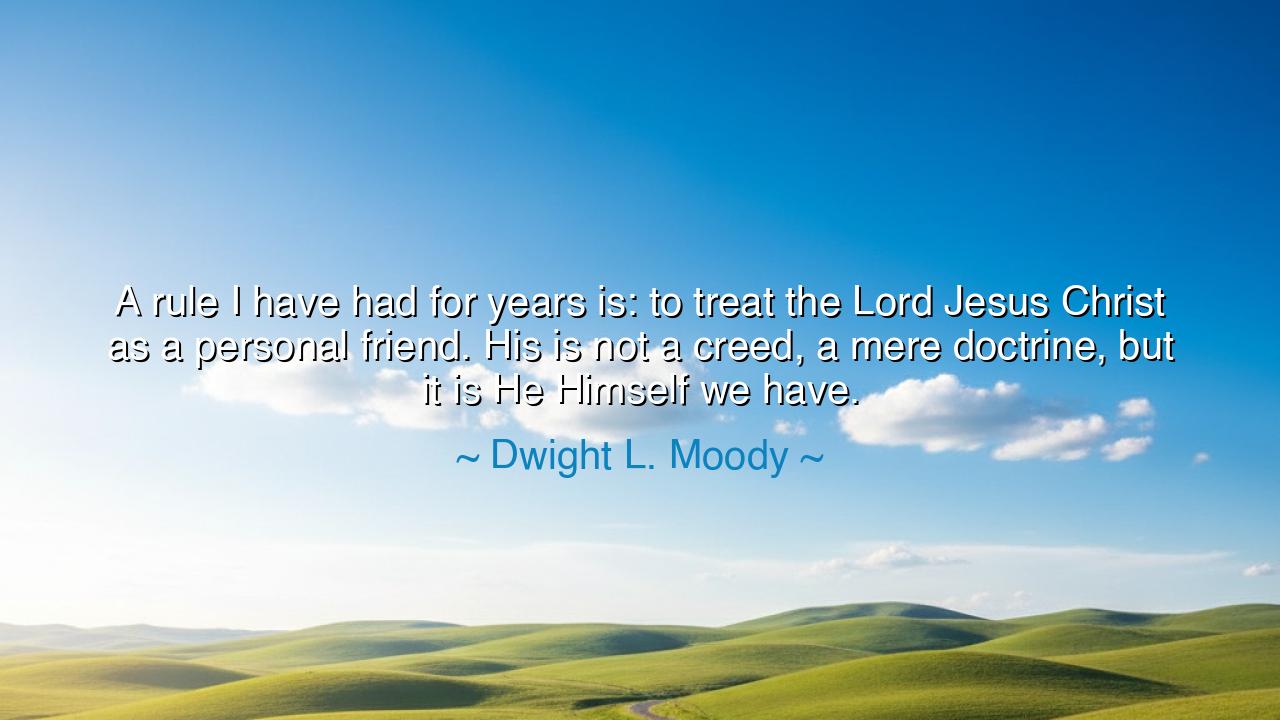
A rule I have had for years is: to treat the Lord Jesus Christ as
A rule I have had for years is: to treat the Lord Jesus Christ as a personal friend. His is not a creed, a mere doctrine, but it is He Himself we have.






There is a tender yet unshakable wisdom in the words of Dwight L. Moody, the great evangelist of the 19th century, who declared, “A rule I have had for years is: to treat the Lord Jesus Christ as a personal friend. His is not a creed, a mere doctrine, but it is He Himself we have.” These words come not from the lips of a theologian lost in abstraction, but from the heart of a man who walked daily in the presence of his Savior. Moody, who reached millions with his sermons, reminds us that faith is not merely an idea to be studied, but a relationship to be lived. In this, he draws a clear line between religion as ritual and faith as communion — between knowing about Christ and truly knowing Christ.
The origin of this truth lies in the very heart of Christianity. When Jesus walked upon the earth, He called not for admirers, but for companions. He did not ask His disciples to memorize a system, but to follow Him, to walk beside Him, to eat, laugh, and suffer with Him. The Gospel is not the announcement of a philosophy, but the revelation of a Person — divine yet near, majestic yet intimate. Moody’s words, therefore, are a call to return to the simplicity of that first love: to speak to the Lord as one would speak to a trusted friend, to find in Him not an institution but an eternal companion.
To treat Jesus Christ as a personal friend is to awaken the heart from its slumber. Friendship implies trust, affection, conversation, and loyalty. It is the bond that turns duty into delight. In Moody’s own life, this rule transformed his ministry; he did not preach as a scholar dissecting truth, but as a man introducing others to the Friend who had changed his soul. When the storms of doubt and failure came — and they came often — he did not cling to dogma alone, but to the living presence of Christ Himself. Thus, his strength did not arise from doctrine, but from relationship.
Consider the story of Mary Magdalene, whose devotion to Christ was not that of a student to a teacher, but of a soul to her dearest friend. When others fled the cross, she remained; when others doubted, she went to the tomb. And because of her love, she was the first to see the risen Lord. It was not her knowledge of Scripture that opened her eyes, but her heart of friendship. In that sacred encounter, she discovered what Moody later proclaimed — that faith is not an idea about Christ; it is Christ Himself, living and breathing within us.
Such friendship requires humility. For one cannot walk closely with the divine without first setting aside pride and pretense. The heart that treats Christ as a personal friend must also learn to be transparent, honest, and vulnerable. It means speaking to Him in the stillness of dawn, confessing fears in the shadow of night, and finding comfort not in formality but in presence. This is the secret of the saints: they did not serve a distant deity, but a living companion, ever near, ever faithful.
And yet, Moody’s words also carry a challenge to the modern soul. Too often, men and women know the rituals of faith but not its warmth. They recite prayers but never converse with the One who listens. They defend doctrines but forget the heart that gives them life. To treat Christ as a personal friend is to restore intimacy to devotion, to make faith breathe again. It is to rediscover the holy joy that religion without relationship can never provide.
Let this, then, be the lesson for all who seek to walk the path of light: do not merely believe in Christ — befriend Him. Speak to Him daily, not with rehearsed words but with the honesty of love. Share your triumphs and your tears; ask for guidance as you would from a confidant. For the Lord of Heaven desires not subjects, but sons and daughters, not worshipers at a distance, but companions at His side. As Moody taught, the truest power of faith lies not in creed or structure, but in the living nearness of He Himself — the Friend who walks beside you, even unto the end of all things.
Thus, remember this eternal teaching: doctrine may inform, but friendship transforms. Seek not merely to understand Christ, but to walk with Him, talk with Him, and love Him. For when your heart learns to treat the Lord Jesus as a personal friend, the world will lose its terror, and your soul will find its rest — not in the idea of God, but in the presence of the living Christ.






AAdministratorAdministrator
Welcome, honored guests. Please leave a comment, we will respond soon